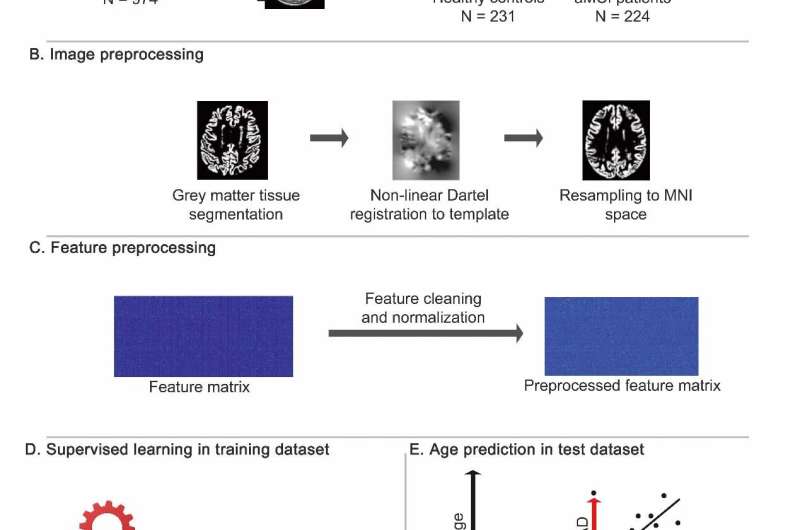#Using AI to track cognitive deviation in aging brains

“#Using AI to track cognitive deviation in aging brains”

Researchers have developed an artificial intelligence (AI)-based brain age prediction model to quantify deviations from a healthy brain-aging trajectory in patients with mild cognitive impairment, according to a study published in Radiology: Artificial Intelligence. The model has the potential to aid in early detection of cognitive impairment at an individual level.
Amnestic mild cognitive impairment (aMCI) is a transition phase from normal aging to Alzheimer’s disease (AD). People with aMCI have memory deficits that are more serious than normal for their age and education, but not severe enough to affect daily function.
For the study, Ni Shu, Ph.D., from State Key Laboratory of Cognitive Neuroscience and Learning, Beijing Normal University, in Beijing, China, and colleagues used a machine learning approach to train a brain age prediction model based on the T1-weighted MR images of 974 healthy adults aged from 49.3 to 95.4 years. The trained model was applied to estimate the predicted age difference (predicted age vs. actual age) of aMCI patients in the Beijing Aging Brain Rejuvenation Initiative (616 healthy controls and 80 aMCI patients) and the Alzheimer’s Disease Neuroimaging Initiative (589 healthy controls and 144 aMCI patients) datasets.
The researchers also examined the associations between the predicted age difference and cognitive impairment, genetic risk factors, pathological biomarkers of AD, and clinical progression in aMCI patients.
The results showed that aMCI patients had brain-aging trajectories distinct from the typical normal aging trajectory, and the proposed brain age prediction model could quantify individual deviations from the typical normal aging trajectory in these patients. The predicted age difference was significantly associated with individual cognitive impairment of aMCI patients in several domains, specifically including memory, attention and executive function.
“The predictive model we generated was highly accurate at estimating chronological age in healthy participants based on only the appearance of MRI scans,” the researchers wrote. “In contrast, for aMCI, the model estimated brain age to be greater than 2.7 years older on average than the patient’s chronological age.”
The model further showed that progressive aMCI patients exhibit more deviations from typical normal aging than stable aMCI patients, and the use of the predicted age difference score along with other AD-specific biomarkers could better predict the progression of aMCI. Apolipoprotein E (APOE) ε4 carriers showed larger predicted age differences than non-carriers, and amyloid-positive patients showed larger predicted age differences than amyloid-negative patients.
Combining the predicted age difference with other biomarkers of AD showed the best performance in differentiating progressive aMCI from stable aMCI.
“This work indicates that predicted age difference has the potential to be a robust, reliable and computerized biomarker for early diagnosis of cognitive impairment and monitoring response to treatment,” the authors concluded.
Exercise may slow brain deterioration in Alzheimer disease
Heang-Ping Chan, Promise and Potential Pitfalls: Re-creating Images or Generating New Images for AI Modeling, Radiology: Artificial Intelligence (2021). DOI: 10.1148/ryai.2021210102
Citation:
Using AI to track cognitive deviation in aging brains (2021, June 23)
retrieved 23 June 2021
from https://medicalxpress.com/news/2021-06-ai-track-cognitive-deviation-aging.html
This document is subject to copyright. Apart from any fair dealing for the purpose of private study or research, no
part may be reproduced without the written permission. The content is provided for information purposes only.
If you liked the article, do not forget to share it with your friends. Follow us on Google News too, click on the star and choose us from your favorites.
For forums sites go to Forum.BuradaBiliyorum.Com
If you want to read more Like this articles, you can visit our Science category.



